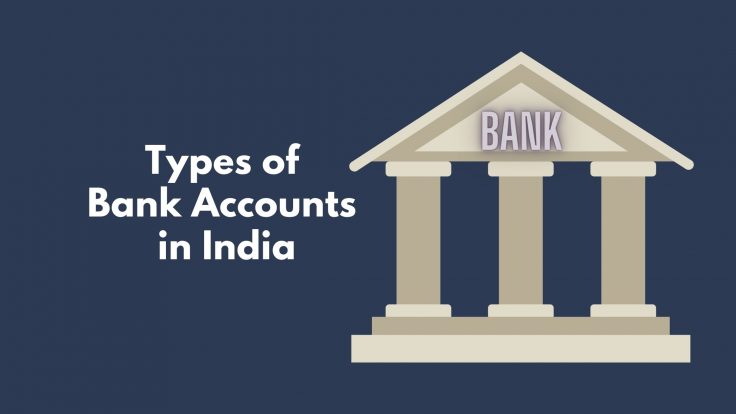Having a bank account in these days has become extremely important. Bank accounts offer simplicity for transactions. one can easily withdraw money and make payments if they have a bank account. Having bank accounts provides a safe treasury of your hard-earned money and even if the bank or the unions are close you are sure to get back your money. Most banks and financial institutions offer the account holders free or low-cost services, hence bank accounts are cheaper. The various types of bank accounts offer different types of benefits
It is an easy way to grow money. Most banks offer an interest rate when you put your money in a savings account. The interest will help your money grow over time. It offers easy access to credits. Having a bank account is favourable as banks provide the facility to access credits to its customers for Personal loan, home loan, education loan etc. There are various types of bank accounts in India.
Given below is the types of bank accounts:
- Savings Account
- Current Account
- Recurring Deposit Account
- Fixed Deposit Account
- DEMAT Account
- NRI Account
Details about types of bank accounts
-
Savings Account
A savings account is a basic type of bank account that allows you to deposit money, keep it safe, and withdraw funds, all while earning interest. Though these types of bank accounts typically pay a modest interest rate, their safety and reliability make them a great option for parking cash you want available for short-term needs. Savings accounts allow you to deposit money for safekeeping while also earning interest on your balance.
| Account holding | It can be opened by an individual or jointly by two people |
| Interest | The bank pays you interest for opening this type of account with them. |
| Features | · Savings bank account is further divided into two types: Basic Savings Bank Deposit Account (BSBDA) and the other one is Basic Saving Bank Deposit Accounts Small Scheme(BSBDS)
· The savings bank account is mostly eligible for students, pensioners and working professionals · The rate of interest that an account holder get varies from 4% to 6% per annum |
| Advantages | · There is no limit to the number of times the account holder can deposit money in this account
· There is no minimum balance that needs to be maintained for this type of an account · The savings account holders can get an ATM/Debit/Rupay Card if they want to |
-
Current Account
A current account, also known as financial account is a type of deposit account maintained by individuals who carry out significantly higher number of transactions with banks on a regular basis. It is created by the bank on request of the applicant and is made available for frequent or immediate access. These accounts are not used for the purpose of savings.
| Account holding | It can be opened by individuals singly or jointly, partners and companies in any Bank. |
| Interest | There is no interest that is paid on such accounts |
| Features | · This type of bank account is mostly opened by businessmen. Associations, Institutions, Companies, Religious Institutions and other business-related works, the current account can be opened
· Overdraft facility is available for current bank accounts · Penalty is charged if minimum balance is not maintained in the current account. |
| Advantages | · There is no fixed number of times that money can either be deposited or withdrawn from such accounts · Internet banking is available · This type of bank account does not have any fixed maturity |
-
Recurring Deposit Account
Recurring Deposit account or RD account is a form of account wherein the account holder needs to deposit a fixed amount every month until it reaches the fixed maturity date. RD schemes allow you to save money on a regular basis and the minimum deposit amount can be as low as RS. 10. The tenure, in these types of bank accounts, is also flexible, and you can choose from 7 days to 10 years depending on your convenience. When you want to save your money, you can open this account.
| Account holding | It may be opened by a person in his own name or by more than one person, in their joint names. |
| Interest | It may range from 5% to 7%. |
| Features | · Nomination facility is also available for RC accounts
· Recurring deposits are best suited for all types of short-term goals · Simple documentation required |
| Advantages | · Passbook is issued for this type of bank account
· Premature withdrawal of the amount is permitted, provided a sum of amount is deducted as penalty · One of the main benefits of recurring deposit account is the attractive interest rate |
-
Fixed Deposit Account
FD or a fixed deposit account is another type of bank account that can be opened in any Public or Private sector bank. In a Fixed Deposit, you put a lump sum in your bank for a fixed tenure at an agreed rate of interest. At the end of the tenure, you receive the amount you have invested plus compound interest. FDs are also called term deposits.
| Account holding | A joint fixed deposit allows up to three investors to open an FD account. |
| Interest | Banks pay interest on the fixed deposit account |
| Features | · The amount deposited in FD account can only be withdrawn all at once and not in instalments
· The rate of interest depends upon the amount you deposit and for the time duration of the FD · Full repayment of the amount is not available before the maturity date of FD |
| Advantage | · If you want to use FDs to save tax, opt for the five year tax saving FD, and benefit from exemptions under section 80c of the income tax act.
· A fixed deposit offers guaranteed returns. · If you choose an FD with a reinvestment option, you will benefit from compound interest |
-
DEMAT Account
DEMAT Account is an account that is used to hold shares and securities in electronic format. The purpose of opening a DEMAT account is to hold shares that have been bought or dematerialized, thus making share trading easy for the users during online trading. Having a DEMAT Account allows you to buy shares and store them safely. It can be used to hold a variety of investments like equity shares, exchange traded funds, mutual funds, bonds, and government securities. The DEMAT account also stands for Dematerialized Account.
| Account holding | A DEMAT account can be a single holder account or a joint holder account. |
| Interest | DEMAT account is for holding Dematerialized securities. It does not have any amount in it. Hence the question of Interest does not arise. |
| Features | · This helps facilitate easy trade of bonds and shares
· KYC is required for opening the DEMAT Account · The transfer of securities can be done with reduced paperwork |
| Advantages | · You can open a DEMAT Account without possessing any shares. and can maintain a zero balance in your account.
· Helps in conducting stress-free transaction of shares · Traders can work from anywhere |
-
NRI Account
To fulfil the bank requirements of a Non-Residential Indian or a Person of India Origin, the option of NRI account is available. An NRI Account refers to the accounts opened by a Non-Resident Indian (NRI) or a Person of Indian Origin (PIO) with a bank or financial institution which is authorised by the Reserve Bank of India (RBI), to provide various services. It is a rupee dominated account and is repatriable i.e. allows you to transfer your foreign income to India. The interest earned from these types of bank accounts is tax-exempted.
| Account holding | NRIs/ PIOs can hold jointly with a resident relative on ‘former or survivor’ basis |
| Interest | The interest shall be 0.50% or 1% below the rate applicable at the time of Deposits |
| Features | · The documentation and process for opening an NRI account is completely hassle-free
· You don’t need to maintain high balances · Opening an NRI Account is easy. Most banks allow you to open NRI accounts without visiting the branch in India. |
| Advantages | · The Fully Accessible Route (FAR) introduced by the RBI facilitates NRI investment in market-linked assets, allowing them to participate in the stock and debt markets in India.
· As per the Indian Income Tax Act 1961, an NRI may avail of tax-free interest earnings on NRE and FCNR accounts. · An NRE account is fully repatriable |
Recommended Read: List of all the private banks in India






